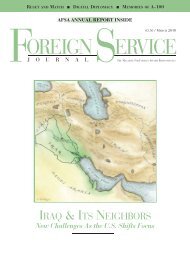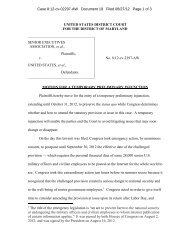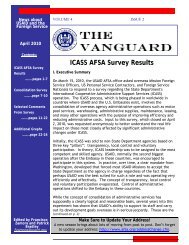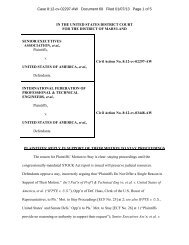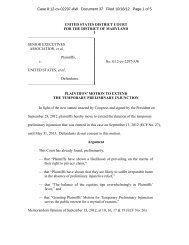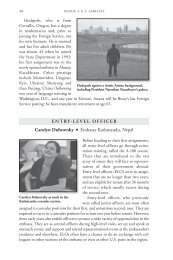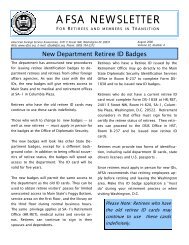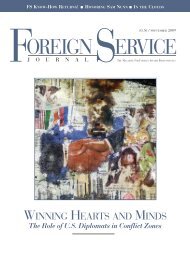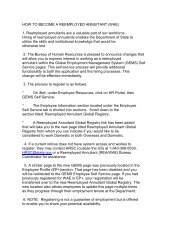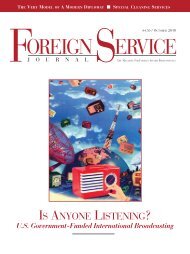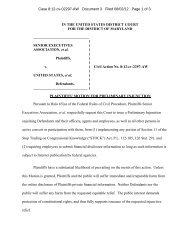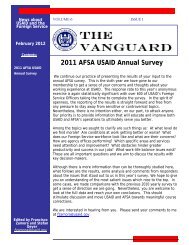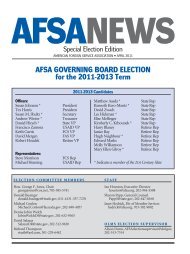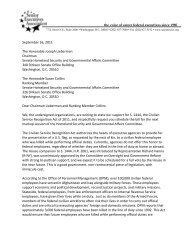F OCUS - American Foreign Service Association
F OCUS - American Foreign Service Association
F OCUS - American Foreign Service Association
Create successful ePaper yourself
Turn your PDF publications into a flip-book with our unique Google optimized e-Paper software.
assignment he had requested despite its being “a wretched<br />
place, with the Chinese cowering under Japanese occupation<br />
and the Japanese corrupted by conquest.” His next post,<br />
Hankow (now Wuhan), was at that time the temporary location<br />
of the U.S. embassy in China.<br />
There, Stilwell and several other military officers were frequent<br />
dinner guests at Davies’ spacious apartment.<br />
However, the largest contingent at his<br />
gatherings were journalists, a group to<br />
which Davies, who had initially aspired<br />
to be a reporter, felt particularly drawn.<br />
When the embassy moved on to the new<br />
Chinese capital at Chungking (now<br />
Chongqing) a few months later, Davies<br />
stayed behind, under conditions of considerable<br />
danger, to protect U.S. interests<br />
under the new Japanese occupation.<br />
After nearly a decade in the <strong>Foreign</strong><br />
<strong>Service</strong>, Davies began his first assignment<br />
in Washington on the China desk<br />
in October 1940. It quickly struck him that working in the<br />
State Department at that time had decided drawbacks. First,<br />
Davies’ supervisors did not inspire respect (one “possessed<br />
the virtues of a model head clerk,” the other was “not much<br />
more than a vigorous pedant”). Second, he was put off by the<br />
parochialism he encountered in the department. Arabists<br />
looked down on Asian specialists, while European specialists<br />
looked down on everybody else; within the Far Eastern<br />
Division, Japan hands and China hands viewed each other<br />
with mutual suspicion. Third, and most importantly, the<br />
White House’s lack of regard for the department had made it<br />
a backwater, to the point where Davies found working there<br />
“stupefying.”<br />
A fourth drawback, of which Davies was unaware at the<br />
time, was the risk of inadvertent exposure to Soviet agents.<br />
One of his colleagues in the Far Eastern Division was a<br />
“tweedy young man” named Alger Hiss, who, perhaps fortunately<br />
for Davies, “did not invite familiarity.” His job also<br />
involved contacts with Lauchlin Currie, a White House special<br />
assistant whom Roosevelt had put in charge of Lend<br />
Lease for China. Currie was first accused of Soviet ties in<br />
1945, and KGB records released in the 1990s confirmed that<br />
he was indeed in close touch with Soviet agents, though<br />
whether he himself became an agent is a matter of dispute.<br />
Finally, in a bizarre coincidence, Duncan Lee, executive<br />
assistant to OSS chief William Donovan and perhaps the<br />
most highly placed Soviet agent ever in a U.S. intelligence<br />
agency, was the fellow passenger whose skill as a parachutist<br />
was noted by Davies in his autobiography.<br />
The Dec. 7, 1941, Japanese attack on Pearl Harbor crystallized<br />
Davies’ dissatisfaction and intensified his desire to<br />
make a more direct contribution to the war effort.<br />
General Joseph Stilwell’s<br />
knowledge of China and<br />
“cheerfully sardonic<br />
attitude” impressed the<br />
similarly inclined Davies.<br />
Fortuitously, three weeks later he had dinner with Stilwell,<br />
now a major general, who had been selected to command the<br />
invasion of North Africa. Eager to be as close to the action<br />
as possible, and to work for someone whom he respected,<br />
Davies suggested the possibility of joining Stilwell as an<br />
adviser. The idea was clearly to the general’s liking, even<br />
more so when his assignment was suddenly shifted, to his<br />
regret, to the command of a new China-<br />
Burma-India theater. With Davies,<br />
Stilwell acquired the services not only of<br />
a friend, but of an officer whose on-theground<br />
experience on both sides of the<br />
war in China exceeded that of anyone in<br />
U.S. government service.<br />
Dropping in on the Nagas<br />
As Stilwell’s political adviser, Davies<br />
divided his time between two headquarters:<br />
New Delhi, where the China-<br />
Burma-India theater command was<br />
located, and the Chinese capital at Chungking, where<br />
Stilwell served as chief of staff to Chiang Kai-shek. While<br />
Chungking was subject to Japanese air raids and health conditions<br />
were extremely poor, by far the most dangerous part<br />
of the job was the airborne commute over the Himalayas via<br />
the “Hump.” With the Japanese having cut the Burma Road<br />
in March 1942, this was the only option to get supplies, and<br />
often passengers, to allied forces in China.<br />
Tellingly, the Air Force deemed the route “the most dangerous<br />
ever assigned to air transport.” During the second<br />
half of 1943 alone there were 155 crashes, a rate of nearly one<br />
a day. The risks came less from enemy air action than from<br />
a combination of rugged terrain, extreme altitude, unpredictable<br />
weather and severe shortages of spare parts and<br />
experienced, properly trained crews. Passengers were under<br />
no illusions regarding their safety. In his autobiography,<br />
Sevareid recalls thinking to himself shortly before boarding:<br />
“If I had any real moral courage, I would refuse to get<br />
aboard.”<br />
At about 8 a.m. on Monday, Aug. 2, 1943, the C-46 (a DC-<br />
3 in civilian life) carrying 14 U.S. military personnel, two<br />
Chinese officers and four U.S. civilians, including Davies and<br />
Sevareid, took off from its base in Chabua, India. About one<br />
hour into the flight, while the plane was over the Patkai<br />
Mountains, a young corporal (“grinning broadly”) informed<br />
Sevareid that the plane’s left engine had gone out. The pilots<br />
turned back toward India, but issued no instructions to the<br />
passengers.<br />
As the crew began throwing passenger bags overboard in<br />
an attempt to gain altitude, Davies went to the cabin to try to<br />
get information, only to return shaking his head and telling<br />
Sevareid, “No goddamn organization here.” As the cabin<br />
JULY-AUGUST 2008/FOREIGN SERVICE JOURNAL 47



